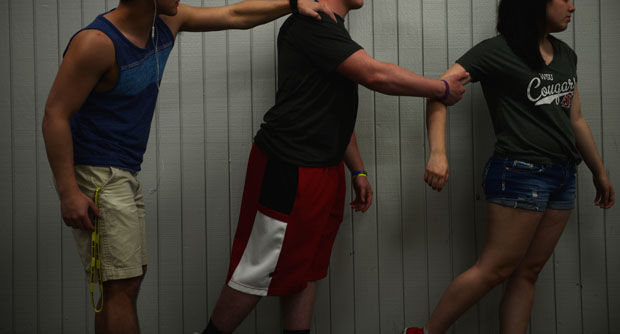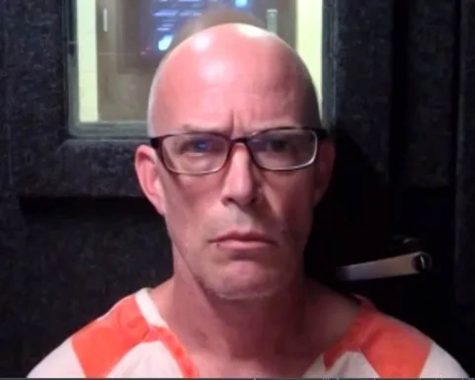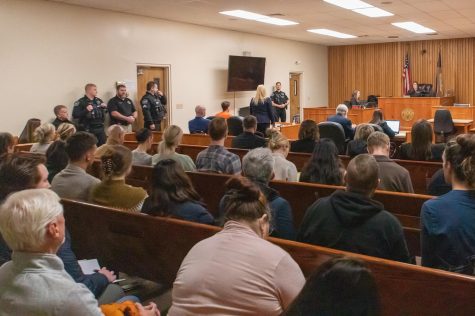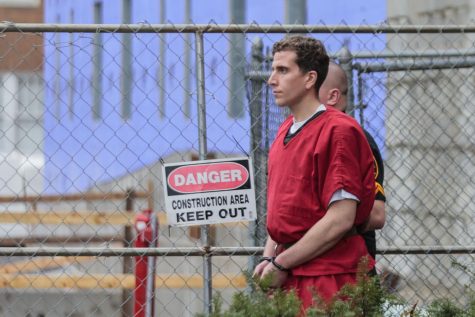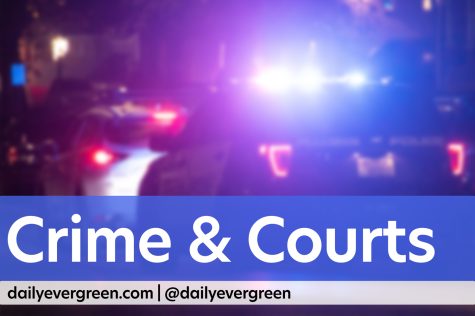Police procedure focuses on sexual assault victim safety
April 29, 2015
Summer is just around the corner, and this summer might mean more potential for crime, including sexual violence.
“Most assaults are being committed by young people between the ages of 18-24,” said Pullman Police Commander Chris Tennant. “You remove those people and all types of crime go down.”
Sexual assault reports do drop during the summer as most students leave town, but as more people stay in town, the risk for all types of crime may increase.
“We’re getting more and more people going to summer school, more and more people signing year-long leases, and less and less people are finding summer employment,” Tennant said. “You add these three things together and it means more people in town and more potential for crime.”
On a yearly trend, sexual assault reports are on a consistent rise. Local police say this is not indicative of changing human nature, but of more reports.
“I think the issue is getting a lot more attention and I think we’re getting more reports, and I think that’s a good thing,” said WSU Police Chief Bill Gardner. “I think one thing that’s changing, especially within law enforcement, is that more agencies are giving more attention to the differences in how an average crime is investigated and how a sexual assault is investigated.”
A sexual assault investigation works to put control back into the hands of the victim. Gardner said in a sexual assault, one person completely takes control away from another, and that it is important for victims of this violent crime to be given control over the situation.
Pullman Police Chief Gary Jenkins said when called to a reported sexual assault, officers will contact the victim – but how to proceed is the victim’s choice.
“There are times that we will contact the victim and they will indicate that they don’t want the police really to get involved,” Jenkins said. “Anywhere along the way it’s always up to the victim whether they want to, if they want the police to stop in what they’re doing. I think we try to be as sensitive as we can to the wishes of the victim.”
Jenkins added that the police mindset is to want to catch the perpetrator. However, he said, the primary consideration is not making the victim feel like he or she is being victimized again.
“Sometimes victims feel victimized just by even telling their story. And so we try to remain as sensitive as we can to that and by the victim’s wishes as to how we should proceed,” Jenkins said.
The numbers from the police documents indicate a localization of assaults around College Hill. Gardner said this happens because that is where most students are.
“It can be an opportunity type of crime, and I think it happens where students gather,” Gardner said.
WSU Police Assistant Chief Steve Hansen said sexual assault reports came in from residence halls, apartment complexes, the Greek system, and private homes.
“It’s pretty diverse on where you’ll see the sexual assault reports come from,” he said.
Once a report comes in, officers will contact the victim and recommend a forensic exam, which is commonly called a rape kit. Forensic exams take place in a hospital or medical facility by trained nursing staff, and gather forensic evidence from the victim. Police can also call an advocate from Alternatives to Violence of the Palouse to explain all the options a victim has.
A forensic exam, which is most effective if conducted in the first 72 hours after an assault, can be done without the victim giving their name. The victim does not need to decide to move forward in the investigation to have a forensic exam done.
“That way if the person changes their mind later we have not lost evidence they otherwise couldn’t get if they didn’t contact us at a later time,” Jenkins said.
A victim can decide at any point to pick up the investigation.
If a victim decides to report the assault, officers will sit down with the victim and conduct an interview. Evidence of sexual assault can be collected via the forensic exam, and officers will collect evidence from the crime scene, if there is one.
“We will attempt to locate witnesses and do as thorough an investigation as we can and collect all the evidence that we can in a case. Anywhere along the way it’s always up to the victim whether they want to, if they want the police to stop in what they’re doing,” Jenkins said.
Gardner said the reporting party may be interviewed several times, which can be difficult. Officers are trained on sensitively interviewing a victim.
“The first interview, they need to be very careful in how that interview goes, because the way people perceive when they’re victimized, the way they perceive what happened can be influenced just by the trauma of the situation, and so sometimes it takes some time for the officer to really understand what has happened, and for the victim to understand what has happened,” Gardner said. “It’s a highly emotionally-charged incident, and so it can take a few different rounds. But in general it’s just a few interviews and then some evidence collection and then periphery interviews.”
After interviews are complete, officers can assess if they have enough evidence against the accused.
“From a law enforcement perspective, that really depends on how much evidence there is and what kind of a case can be made,” Gardner said. “Generally, the police department will make a decision to either forward charges if there’s evidence that a crime has been committed, or they may not depending on several factors; the wishes of the victim or the merits of the case.”
Gardner said the police experience pressure to pursue an investigation at all costs, but the investigation is about giving control of the situation to the victim.
“Certainly we get pressure from a lot of parents who want something done. From victims who kind of need to make their own way. From a university that says we have a job to do here and we want to create the right environment. From a federal government who wants us to handle every sexual assault the same way,” Gardner said. “There’s just a lot of moving parts there that don’t always line up right, and so you have to have people on the ground making sure that somebody doesn’t get run over in the process. That is really the hardest part of this.”
In addition to the investigation of the crime, police are also engaged in attempts to change the culture and prevent the crime from ever occurring.
Jenkins said the Pullman PD was involved in public education efforts, as well as prevention efforts on College Hill. One office is assigned exclusively to College Hill, where many students congregate, and that officer works with student groups and individual students.
Jenkins said he discussed things like watching out for one another, the idea of Cougs helping Cougs, bystander intervention, and safe alcohol use, since many sexual assaults happen when alcohol is an influence. Jenkins suggested a ‘designated friend.’
“We hear about having a designated driver but having a designated friend that doesn’t use alcohol that will maybe help watch out for other people,” he said.
He characterized it as helping people help themselves and their friends, since police are limited in what they could personally do to prevent a crime from occurring.
“It is really … providing some tips and some things to think about ahead of time before you’re in a situation that becomes difficult, or helps recognize situations that your friends might be in where you can perhaps intervene in some way to prevent something from happening,” he said.
Hansen spoke similarly, recommending students decide before going out what they do and don’t want to do that night, so friends can look out for each other.
The WSU Police Department has 24-hour patrols on campus, blue emergency phones, and security patrols out Thursday through Saturday evenings. Additionally, they support university programs like Green Dot.
“Let’s say Testing and Counseling Services or somebody from that group goes out and does an education program, our officer may go out as well and answer questions,” Hansen said. “We’ve also worked with student health and with Pullman Regional Hospital for if someone goes in for a forensic exam and they want to do it anonymously, we’ll still take the evidence and stuff and hold it strictly confidentially, you don’t even know who provided the samples.”
Gardner said that to change a culture accepting of sexual assault, we need to start with the men.
“Let me go out on a limb here, this is a man’s problem, men perpetrating,” Gardner said. “This is a man’s problem and I think this is a place we really need to hit hard. If we’re going to change a culture about this from the culture that allows this to go on to a culture of reporting, I think we have to get men really, really involved.”
He recalled one instance on a panel when he heard a speaker say, ‘I teach my 13-year-old boy not to be a rapist.’ “I think that’s the key,” he said.
Police also want to change a cultural view that coming to the police means the victim loses control of the report.
“I think a lot of people have in their mind how police are going to respond to the report and a lot of that time it isn’t a good image that they have in their minds,” Jenkins said. “So a part of the education effort that we do with our officers is explain how to conduct an investigation, but they do have control of that investigation insofar as whether we continue it and that we can discontinue it at any time if they want to do so.”
Jenkins has been in law enforcement for 40 years, and said he has seen the field change the way it deals with sexual assault. Advocacy groups like Alternatives to Violence of the Palouse are relatively new things, he said.
“I think now there is, rightfully so, a lot of emphasis on being sensitive to needs of victims,” he said. “I think (victim support groups) makes it a more robust criminal justice system so that we can better address the problem of sexual assault.”


